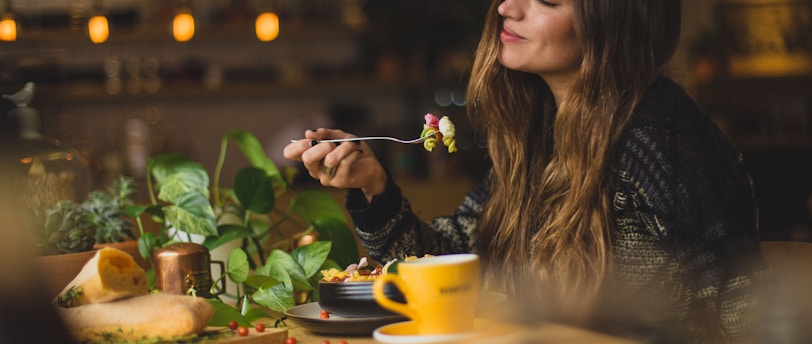Discover Exercise, Beauty, and Wellness Rituals for Women
My Journey with Intuitive Eating
Discover how intuitive eating transformed my relationship with food, body, and self-worth. As a coach with a history of binge eating, I share a heartfelt, personal journey toward food freedom, body trust, and a softer, more sustainable approach to nourishment.
WEIGHT LOSSWELLNESS
4/18/20255 min read


Let me take you back to a version of myself that, honestly, feels like another lifetime. I was the girl with the color-coded meal plan, obsessively tracking every bite, every calorie, and every “good” or “bad” food decision. My mornings began with guilt, my evenings ended in restriction or rebellion, and food had stopped being something I enjoyed—it was something I controlled. Or rather, it controlled me.
Now? I sit with my coffee and breakfast, take a deep breath, and ask myself, “What does my body need today?”
This shift didn’t happen overnight. It came from unraveling years of dieting culture, perfectionism, and chasing unrealistic body ideals. It came from learning to reconnect with my body’s cues, learning the language of hunger and fullness, and treating food as nourishment—not a moral decision. Welcome to my journey into intuitive eating.
What Is Intuitive Eating, Really?
At its core, intuitive eating is about trust. It’s a self-care framework that helps you reconnect with your body, rather than relying on external rules. You learn to eat when you’re hungry, stop when you’re full, and choose foods that make you feel good—physically and emotionally.
Developed by dietitians Evelyn Tribole and Elyse Resch, intuitive eating isn’t just about “eating whatever you want.” It’s about curiosity, compassion, and connection with your body. It’s about letting go of the food rules that make you feel small and learning to take up space—in your choices, your body, and your joy.
My Turning Point
I was 27, living in a whirlwind of deadlines, workouts, and what I thought was wellness. I had just started coaching professionally, and I felt like I had to “look the part” 24/7. I was constantly performing wellness, but inside I was burnt out.
I remember one night vividly: sitting in my kitchen with a bag of popcorn, exhausted and emotionally drained, eating not because I was hungry but because I didn’t know how else to comfort myself. It wasn’t the first time. I had struggled for years with binge eating—eating past fullness, feeling ashamed, promising to “start over” tomorrow. The next day, I punished myself with a brutal workout and green juice. And that’s when it hit me.
This wasn’t health. This was disconnection. It was a survival pattern. A cry for kindness.
I realized I needed to start asking myself deeper questions—not just "What should I eat?" but "Why am I eating?" and "What am I feeling?" That’s when I found intuitive eating. And it felt like the most radical act of self-respect I had ever committed to.
How I Started Healing My Relationship with Food
The first step was permission. Permission to eat, to rest, to feel. I stopped labeling foods as good or bad. I started paying attention to how food made me feel—energized, sluggish, bloated, satisfied. I swapped restriction for curiosity.
I created rituals around eating that made me feel cared for. Lighting a candle at dinner. Putting my phone away. Sitting down, breathing, tasting. It was slow. It was awkward at times. But it was mine.
As someone with a history of binge eating, I also had to unlearn the “all or nothing” mentality. That took therapy. And patience. And a lot of honest journaling. I stopped blaming myself for the past and started meeting my needs in the now.
The Gentle Power of Honoring Hunger and Fullness
Learning to honor hunger wasn’t easy. Years of dieting had trained me to fear hunger, to view it as something to resist. But hunger is not the enemy. Hunger is a message. It’s a whisper from your body saying, "Hey, I need something."
So I started listening. Without judgment. Without overthinking.
Some mornings, that looked like a hearty breakfast with eggs, toast, and fruit. Other days, just a warm cup of oat milk matcha and a banana felt right. At night, sometimes it was a nourishing meal with roasted veggies and quinoa. Other times, it was pizza on the couch with my partner while cuddling our cats.
And fullness? That took time too. I had to learn to pause halfway through my meal, breathe, check in. Not to count bites, but to simply ask, “Am I still enjoying this? Am I feeling satisfied?”
It was never about perfection—it was about building trust again.
We often demonize emotional eating. But here’s the truth: food is emotional. It’s culture, memory, celebration, and comfort. Instead of shaming myself for emotional eating, I started looking at it as a message. What am I needing right now that I’m trying to get from food?
Sometimes the answer was rest. Sometimes connection. Sometimes just a damn cookie and a hug.
I learned to diversify my coping tools—journaling, walking, petting my dogs, stretching, calling a friend. And when I did eat emotionally? I did it with intention, not guilt. That’s the difference intuitive eating makes.
There’s nothing weak about needing comfort. And nothing wrong with finding it in food occasionally. It’s just one tool among many.
Intuitive Movement Completes the Picture
As a coach and wellness lover, I’ve always had an active life. But intuitive eating also transformed how I moved. I stopped pushing myself to do intense workouts when I was exhausted. I started walking more. I fell back in love with Pilates. I danced in the kitchen. I rested without guilt. Movement became another way of checking in with myself, not punishing myself. It’s all connected—how you eat, how you move, how you feel in your body.
My favorite movement moments now? Sunset walks with my dogs. A slow morning stretch. A strength and Pilates session with soft music and no mirrors. The intention is joy—not discipline.
My Advice If You’re Just Starting Out
✨ Start small. Choose one meal a day to eat without distractions. Focus on the taste, texture, and how it makes you feel.
✨ Drop the labels. Food is just food. No moral strings attached.
✨ Honor hunger. Feed it kindly, without fear.
✨ Pause for fullness. Not to restrict—just to notice.
✨ Feel your feelings. You’re allowed to comfort yourself without judgment.
✨ Get support. This journey is easier with guidance, whether from a coach, therapist, or community.
✨ Be patient. Especially if you have a history with binge eating or disordered habits. You’re unlearning survival mechanisms.
The Soft Power of Intuition
This journey has changed my life—not just my relationship with food, but my relationship with myself. I trust my body now. I respect her voice. I nourish her, move her, rest her.
She’s not a project. She’s my home.
And in this home, there’s room for joy, connection, softness, satisfaction. There’s room for you too.
BABE!
If you're tired of fighting your body, maybe it's time to stop the war. Maybe it's time to come home. Intuitive eating is not about perfection—it's about presence. It’s about remembering that your body is wise, your hunger is valid, and your worth is never measured in pounds or portions.
Let it be sacred. Let it be soft. Let it be yours.
With love and light, 🕯️✨